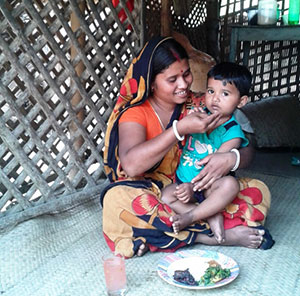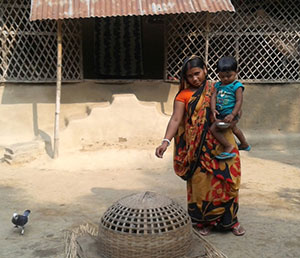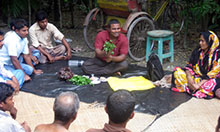The Critical Role of Community Nutrition Champions in Bangladesh

Dolly Mollick lives in the Khulna division of Bangladesh with her husband and 23-month-old baby. Despite the best efforts of her husband, an agricultural day laborer in their village of Bahadurpur, the couple struggled financially, finding it difficult to “make ends meet.” Determined to provide better nutrition and care for her baby, Dolly decided to enroll in a Farmer Nutrition School (FNS) in Bahadurpur in October 2013.
Funded by USAID and implemented SPRING, the FNS conducts training sessions over nine months—Dolly attended every one. The lessons taught her about the significance of nutrition and hygiene practices in households, as well as how to improve vegetable farming, raise local chickens, and cultivate fish to increase the amount of nutritious food available to her family.
During the FNS sessions, Dolly practiced techniques for sowing seeds, planting seedlings in beds, and using integrated pest management. The training methods included hands-on sessions, participatory discussions, and opportunities to ask questions of experts. SPRING staff gave Dolly and her peers seeds and technical support to grow nutritious vegetables, as well as special containers to save seeds for future planting seasons.
“Previously, my homestead land wasn’t properly utilized for vegetable cultivation. However, after attending the gardening and nutrition sessions, I have been growing different nutritious vegetables at my courtyard for my family,” Dolly said proudly.
Dolly noted that during the FNS, she learned that animals are an important source of protein-rich foods for the physical and mental growth of her child. Learning how to raise local chickens has helped her increase production significantly. She also followed SPRING’s guidelines to create a suitable pond environment for increasing fish production.
I am happy that I can feed one or two eggs to my baby every single day. In addition, I can now provide meat or fish from our own sources on most days of a week. My baby is a lot healthier now
--Dolly Mollick

To address the issue of hygiene, Dolly installed two tippy taps, one near her family’s kitchen and one near their latrine. These simple handwashing stations are easily accessible to her family. She believes she owes the reduced occurrences of sickness in her family to their improved hygiene and handwashing practices.
During the FNS, Dolly also learned about the benefits of exclusive breastfeeding and complementary feeding. After her graduation, she was nominated by her peers to serve as a community nutrition champion in the Bahadurpur village. In this role, she provides support to pregnant or lactating women and mothers with children under the age of two in her community.
“If I receive any updates on health, hygiene, or nutritional issues from the community health care provider, I share them with my group members whenever I meet them,” Dolly said.
Dolly is one of many women reaping tremendous benefits from FNS training. She believes her actions have had a ripple effect throughout her family and communities, helping other members adopt positive changes in nutrition and hygiene. Her journey is an important example of the health gains that can be made through simple but demonstrably better approaches to household agriculture, hygiene, and nutrition.
